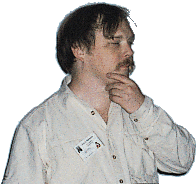I'm going to try and hit 2 birds with one stone and talk about Nuclear Technologies...this will cover the past 2 classes! Woohoo!
So, first off, a little history.
I am going to begin with a lesser known scientist who was responsible for the Manhattan Project. Leo Szilard. Szilard was a Hungarian scientist who initially conceived the idea of a nuclear chain reaction. He was working in New York with Enrico Fermi when they successfully executed a chain reaction using uranium.

Einstein, left -- Szilard, right
During this same time, the Germans were also working on developing a chain reaction, which would lead to nuclear weapons. Szilard knew of the danger if the Germans developed this technology first, so he wrote a letter to FDR telling him of this problem and encouraged the development of a program to get there first. Since Szilard wasn't very famous, he approached fellow scientist, Albert Einstein and convinced him to sign the lettter.
"I really only acted as a mail box. They (Szilard, et al) brought me a finished letter and I simply signed it" -- Einstetin to his biographer Antonia Vallentin (
source)
With Einstein's fame attached to the project, FDR approved the formation of the Manhattan Project.
la la la ---- scientific stuff happens ----
Now we are in the middle of the second World War. The European Axis have been fighting in Europe for more than 3 years. American enters the war, and launches D Day. The war finally ends in Europe 11 months after D Day with the surrender of Germany.
Unfortunately, Japan was still in the war. Ever since Pearl Harbor in 1941, the US had been fighting them in the Pacific Seas. Those battles had been waging for 4 years, and there was still no clear victor.
Now we get into a bunch of debated history --- Why did we drop the Atom Bomb?
I'll let you decide you're own opinion, but here is the general explanation of why we did:
1. Japan had countless ground troops. An invasion similar to D Day would cause exponential causalities.
In a nutshell, that is the major point. Japan had over 9 million infantry that would be waiting on the beaches if we invaded. If the war in Europe lasted almost 4 years and the war in the Pacific had already lasted 4 years, how long would it take to overcome Japan?
On July 26th, Truman basically told Japan to surrender or else("the inevitable and complete destruction of the Japanese armed forces and just as inevitably the utter devastation of the Japanese homeland"). They rejected the ultimatum 2 days later.
So, we decide to drop a bomb on them. Not just any bomb---a unique, one of a kind bomb. There was literally NONE like it in the world. Dubbed 'Little Boy', it contained only 65 kg (135 lbs) of uranium and 2200+ kg of other stuff. It was dropped, and the world took notice.
The amazing part of the following events was this: Japan DIDN'T SURRENDER!
Again Truman told them to surrender or "they may expect a rain of ruin from the air, the like of which has never been seen on this earth."
Well, they ignored the request for unconditional surrender again...guess what happened....
We dropped another bomb, Fat Man, and after that, Japan surrendered.

Little boy, meet Fat Man
Total, over 250,000 people were killed because of the bombings within the first 4 months after the bombings, with countless more coming the following years.
Will I be able to continue this? If not, here are my random thoughts:
FDR is the man. elected to 4 presidential terms, even with polio.
The reason I am fascinated with the atomic bombs (I write every term paper, free response, research paper on WWII or the atomic bombs) is because the first was dropped on my birthday---40 years earlier.
I also learned about Leo Szilard because I served in Hungary and I like looking for obscure hungarian inventors --- the Rubik's cube, ballpoint pen, and nuclear chain reactor---nice resume

















